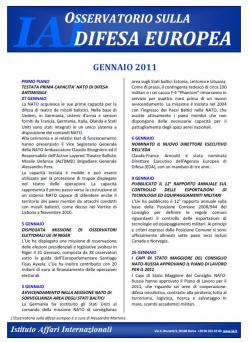Observatory on European defence, April 2005
April 2005
EU, NATO - Missions in Sudan, Congo, Middle East
During the month of April, Europe confirmed its attention for the stabilization of African and Middle Eastern areas; several missions were approved or discussed.
On 21 April, at the informal meeting of NATO Ministers of Foreign Affairs in Vilnius, several positions emerged on the possible role of the Atlantic Alliance to support the mission of the African Union in Darfur, Sudan.
The French Minister of Foreign Affairs Barnier, is in favour of a greater role for the EU, considering that NATO can offer logistic aid and financing, but cannot send soldiers, while NATO Secretary General de Hoop Scheffer and US Secretary of State Rice are in favour of deploying troops.
On 30 April the inaugural ceremony of the EUPOL Kinshasa police mission in Congo (DRC) was held, it is the first EU civilian mission for crisis management in Africa (about 30 people with a funding of 4.3 million euros). This mission, activated upon request of the local government, is devoted to the training of more than 1,000 Congolese policemen.
EUPOL Kinshasa will be assisted by another small (8 experts) support mission called EUSEC, aimed at training local administrations and armed and police forces. This mission, which is to last 12 months (with a budget of about 1.6 million euros) is be launched by the EU in May.
The EU Council of 7 April also approved the deployment of soldiers (220 of which Italians) to support the UN mission in Sudan (UNMIS, with 10,000 soldiers and 715 police officers) for the implementation of the peace agreements, for an initial period of 6 months.
Moreover, on 20 April the High Representative for CFSP, Solana, announced the installation in Ramallah of a EU coordination office to support the Palestinian operational police forces and the reforms of the Palestinian Authority.
April 2005
Europe, USA - China Arms Embargo
The lifting of the arms embargo on China remains a central issue of the political debate on CFSP and ESDP, especially with regard to its transatlantic implications.
On 4 April, US Deputy Secretary of State Zoellick confirmed US opposition, predicting negative repercussions lapses, in particular in the area of sensitive technology transfers and defence industrial cooperation.
On 14 April, the European Parliament confirmed its negative opinion and insisted on a reform that makes the EU Code of Conduct binding for arms export, and on linking the lifting of the embargo dating back to 1989 to progress in respecting human rights and democracy in China.
The informal meeting of the EU Foreign Ministers on 15 April took note of the lack of consensus. The discussions to strengthen the EU Code of Conduct on arms exports continue; on 25 April, the General Affairs and External Relations Council adopted an updated version of the common list of military equipment regulated by the Code.
14 April 2005
European Parliament - CFSP Resolutions, European Security Strategy
The European Parliament approved by a large majority the annual report of the Council on CFSP and the European Security Strategy.
Also discussed and approved were the progress made in EU military capabilities (the European Defence Agency, the Warning and Planning Cell, the Battlegroups) and the guidelines on civil and military security proposed by the High Representative for CFSP Solana, in accordance with the principles of effective multilateralism and preventive commitment of the EU, also in case of natural catastrophes.
14-15 April 2005
EU-UN - Joint Exercice
The European Union and the UN (in particular the Department of Peacekeeping Operations, DPKO) conducted a joint exercise (without deployment of forces) in the ESDP framework.
The progress made in the collaborative relations established in 2003 was examined, and the exercise tested the launching and conduct of a UN-support operation, under EU political control and strategic direction and with the involvement of EU Institutions and member States.
22 April 2005
European Defence Agency - WEAG and WEAO Incorporation, Research and Technology
The Research and Technology (R&T) Steering Board of the European Defence Agency (EDA) met for the first time, chaired by German R&T Director Dirk Ellinger (following his appointment by Solana on 15 April).
A decision was adopted to transfer progressively the activities of the WEAG (Western European Armaments Group) and WEAO (Western European Armaments Organisation) to EDA, as they end within the Western European Union (WEU), between May 2005 and March 2006.
Moreover the Steering Board approved the operational principles concerning the R&T functions of the Agency, aimed at monitoring, structuring and boosting a European policy for research in the defence field. The progress being made on the technological programme related to Unmanned Aerial Vehicles (UAV) was examined.
Previously, on 18 April, Witney, Chief Executive of the Agency, has submitted a report on the work of the EDA to the European Parliament Defence Subcommittee; it emerged that greater funding is needed for research and common projects, as foreseen by the working programme established in November 2004 on four leading projects concerning command, control and communications (C3) capabilities, armoured fighting vehicles, UAVs and promotion of a common armaments market.
-
Details
Roma, Istituto affari internazionali, 2005 -
Issue
05/04



